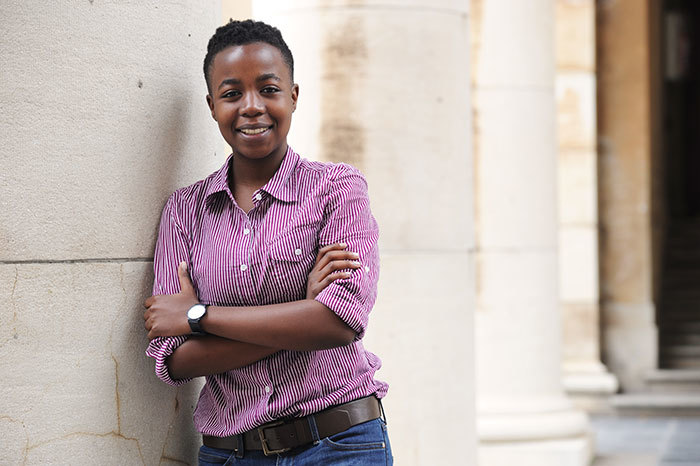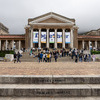Meet the new SRC president
20 October 2014 | Story by Newsroom
UCT students have spoken; and after a successful 2014 Students' Representative Council (SRC) election, representatives for the upcoming academic year have been chosen. Yusuf Omar spoke to president-elect Khanyisa "Baz" Pinini of DASO (the DA Students Organisation), to find out about her plans for the coming academic year.
Though the 2015 SRC is made up of independent, ALUTA and DASO candidates, all 10 DASO candidates were elected. Do you think that's significant? How do you think that will impact the student body?
It is significant in that such a turnout has not previously occurred in the council. However, having attained our first goal, our focus has now shifted. A strong and effective SRC is now our highest priority, the challenge being to show students that we are committed to creating a better and more productive campus for all students. As the SRC-elect, we don't only represent the people who voted for us, but each and every student who needs assistance. We are completely transparent and welcome all contributions. After all, we are the Students' Representative Council, and it's now the time to represent all students.
The SRC is a vehicle for the student voice. What are some of your plans for 'putting students first'?
The only way to put students first is to have a team that is dedicated to effective representation and positive change. I believe that the SRC of 2015 has those qualities. We are a very diverse group of students, and I believe that we will be able to put personal and political views aside for the betterment of UCT students. By doing this, we can represent the views of students, and can find new solutions '“ through policy development '“ for student issues that repeatedly hinder progression and graduation.
How do you plan to keep debate thriving on campus?
Debate is a really healthy part of discussion and dialogue. We want to create a truly representative SRC, and that can only happen through student engagement. Student Assembly is a useful forum to gauge what students think, but we need to create an SRC that is available on demand to the students. That is why the Mobile SRC and C3 campaigns are so essential. We can also use public-forum debates and events to allow students to voice their concerns. There are of course going to be times when we need to comment on current affairs and we don't have enough time to call a Student Assembly; in those situations, we need to look to our social media platforms and the essential sub-committees that we have in the residence and faculty council sectors, so that we are not representing our personal views, but those of the students.
What will be priority areas during your term of office?
Having not formulated an official strategic plan for the upcoming year or officially resumed office yet, I can only summarise the overall focus areas from individual manifestos and brief discussions '“ all of which target transformation '“ both institutionally and conceptually. These range from lobbying for improved academic support structures, disability and recognition, withdrawal of fossil fuel supply and reinvesting ethically, and intersectional approaches to the UCT demographic at large. In addition, we attend the top university in Africa, but often our support systems do not replicate this. I want the SRC of 2015 to improve the academic and financial support systems at this university, for all students in need ... It often feels as though UCT has an 'exclusion policy', but I think that our university should start implementing an 'inclusion policy' '“ one that enables students to succeed, so that our graduating class has the same demographic representation as the classes we accept in first year. Finally, I think that it is essential that we have fair representation of all students. Often people are elected onto the SRC and forget that they represent the views of 27 000 students. I want to ensure that students are consulted properly, so that we may effectively represent their views when drafting policy, or in committee sittings with the University.
Have you identified any particular projects '“ new or current '“ that you would like to focus on?
It is important to identify where you can build on the achievements of the previous SRCs; but ultimately, we need to look at new ways of solving problems that have repeatedly burdened students. We want an SRC that has real, attainable deliverables that can effectively help students to succeed. In that regard, the 2015 SRC will mobilise the Students' Rights Charter and the UCT Transformation Charter. Furthermore, the 2015 SRC will formulate policy for overlooked areas such as disability and recognition, and reinvestment in renewable energy supplies. I think it is essential that our academic support programmes are tailor-made for each faculty, but provide an equal amount of assistance to students who are especially at risk of academic exclusion. That way, no matter which faculty you are registered in, you have an equal chance of success. Secondly, it should be our main focus to create an SRC that is available on demand to students by ensuring that initiatives such as Mobile SRC are continued. Only by knowing what students truly think can we legitimately represent them through our campaigns and policies. Finally, transforming our university so that it more accurately reflects our country is imperative. I want to increase the number of black, coloured and Indian graduates so that we can have true economic transformation in our society. Initiatives such as the Bailout Fund and the Crisis Fund need to be supported so that students who are struggling financially are assisted. Finally, identity '“ whether it is based on race, sexuality, gender, or class '“ needs to be challenged, so that we not only transform our university, but our mindsets as well.
In your view, what would a successful year for the SRC look like?
I think it's difficult to predict the challenges that we may face as an SRC in 2015, and so my view of a successful year may change. However, there are certain principles that I hope the team will maintain. From the beginning, I think that it is essential that each member of the SRC puts their political or personal views aside, and does what is best for the student body. From here, we can initiate projects and policies that truly make a positive impact in the lives of students. Finally, we need to ensure that there is effective representation of the student body when the SRC comments on, criticises or compliments current affairs, or the decisions of UCT management.
Image by Michael Hammond.
Read more:
2014/5 SRC Portfolio AllocationsA DASO dominated SRC
 This work is licensed under a Creative Commons Attribution-NoDerivatives 4.0 International License.
This work is licensed under a Creative Commons Attribution-NoDerivatives 4.0 International License.
Please view the republishing articles page for more information.










